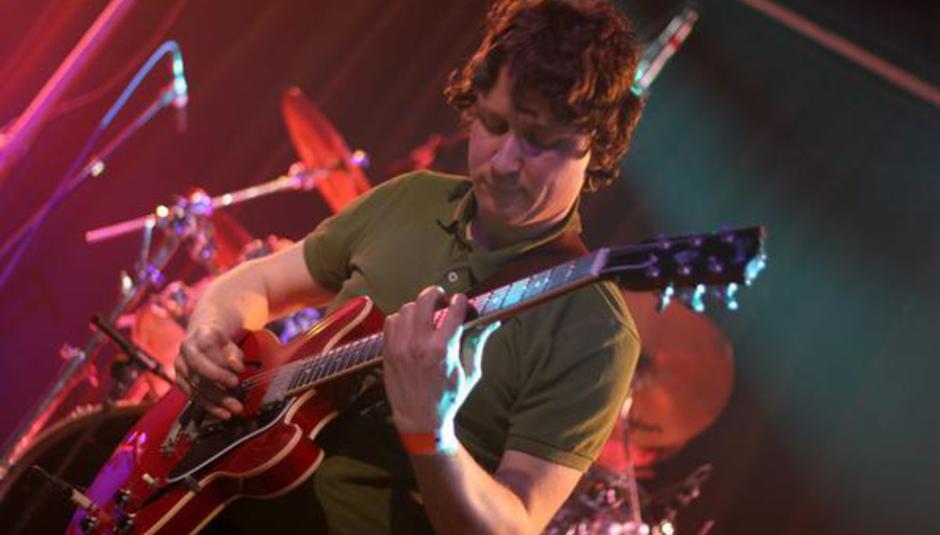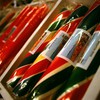Atmospheric guitar band Engineers might not win many awards for being prolific, but as far as quality control goes, they've unquenchably high standards to maintain. While 2005's self-titled debut sowed the seeds somewhat, last year's Three Fact Fader raised the bar to a new level, buoyed on by almost universal praise from all corners of the media. Last month saw the release of their third long player In Praise Of More, and while it continues in a similar vein to where its predecessor left off, there's been nowhere near as much attention bestowed upon its diligent wares.
Of course their recorded output only tells part of Engineers story. Initially formed in London by Simon Phipps (vocals/guitars), Mark Peters (bass/keyboards), Dan McBean (guitar) and Andrew Sweeney (drums), the band had a mini-crisis to deal with soon after Three Fact Fader's release when both McBean and Sweeney left to pursue other projects. With vacancies to fill and several new songs in the pipeline Phipps and Peters had something of a re-jig with the line-up, Peters switching to guitar to accommodate Daniel Land (of The Modern Painters & The Steals fame) on bass, producer, remixer and DJ extraordinaire Ulrich Schnauss on keys and Matt Linley on drums.
It's a cold November night in the centre of Nottingham, and DiS is here trying to keep warm as well as engage in conversation with the collective known as Engineers. Brrrrrrrrr...
DiS: After the widespread acclaim that greeted Three Fact Fader last year, the follow-up In Praise Of More seems to have had a more low-key release. Was that deliberate on your part?
Mark Peters: It was originally going to be a mini-album, and then we decided to expand it so that there'd be tracks on the record with everybody involved.
DiS: Do you feel in some ways that after Three Fact Fader raised your profile you've failed to capitalise on that to an extent?
MP: Maybe things should have moved a lot faster after Three Fact Fader, but then with two people leaving and three new members joining the band in the interim period that was always going to slow the whole process down again. I think the fact we managed to get In Praise Of More out there so seem after all the upheavals was an achievement in itself, and in a way I see that record as the beginning of a new era.
DiS: The album does seem to have come out pretty quickly after the gap between the first two records. Were most of the songs already waiting to be released or is In Praise Of More completely new material?
MP: It's all new material that was written at the back end of last year.
Ulrich Schnauss: I think there's two main reasons for the way In Praise Of More came to be. Firstly I think what Mark has said accounts for part of the reason, but secondly I feel the general climate for this kind of music has changed somewhat and that might affect the way the record is being perceived. Three Fact Fader luckily came out when the whole shoegaze revival was at its peak and got a lot of media attention off the back of that but I don't think that's the case with this album.
DiS: It's interesting you say that. Does it worry you that Engineers may be perceived by many as being a predominantly shoegaze band?
US: I always had a bit of an ambiguous feeling about the shoegaze tag. If you're trying to make a living out of music it pays to be pragmatic about these things. It has helped in the past but now the climate's changing we need to be careful to ensure it doesn't harm what we do in the future. I don't think that label fully describes what we're about musically. We aren't just a shoegaze band, and if you were to question all five of us on our favourite artists or records very few would be associated with that genre. It was a useful commodity for a very short period of time but the sad reality is time's moved on and so have we.
DiS: Losing Dan McBean and Andrew Sweeney so suddenly must have been quite difficult to contend with at the time. Was there ever a point where you questioned whether or not Engineers would be able to continue as a band?
MP: Definitely. You have to bear in mind that there was a long hiatus between Three Fact Fader being finished and it actually coming out, but at the same time the way the new line-up materialised wasn't by way of protracted auditions and interviews either. Me and Daniel had been playing together in another band, Ulrich I'd worked with previously and it just happened that he knew a great drummer, Matt, who was looking for a band at the time.
Daniel Land: I'd actually toured with the previous incarnation on second guitar before, so when Dan and Sweeney left it did actually feel like there was still a majority left in a way.
DiS: Do you ever see yourselves working with Dan and Sweeney again in the forseeable future?
MP: Engineers wasn't the only time I worked with both of them. I've been in bands with them since I first started making music fifteen years ago and I think they'd definitely agree with me when I say that it wasn't so much musical differences but more a case that we'd all moved on personally as individuals. We all had different things in our lives that we wanted to achieve and I think that's still the case.
DiS: The first time I saw the current line-up would be at the Scala with Chapterhouse in March, and the most striking aspect was the new interpretations of older songs which seemed to take on a whole new lease of life.
DL: When you bring different people in it's inevitable some things will sound different. We could have probably tried to replicate what was there before but then neither me, Matt or Ulrich played on either of the first two records.
MP: I think also the fact we left it really late to tour Three Fact Fader meant that there was a certain amount of interpretation required even for me and Simon to go back over those songs again, and the fact the basic chord sequences and melodies stand up to any kind of deviation speaks volumes for the songs themselves. I'd like to think Daniel, Ulrich and Matt's contributions have enhanced them even further, and I think from a personal point of view we're a much better band for their input.
DiS: Would you ever consider re-recording some of your older material with the new band members?
Simon Phipps: It wouldn't be something we'd consider doing at this moment in time but maybe in the future, who knows?
MP: It's the sort of thing that might happen on a b-side or as a live release maybe...
DiS: In terms of working together and getting the live set ready did that take a lot of time as I know you're all based in different parts of the country?
MP: No, it happened pretty quickly to be fair. We were asked to do the Chapterhouse show at the end of last year so we had a long time to plan the set for that. It took us a while to get in touch with Matt actually - we kept leaving messages for him on his MySpace and eventually after about two months we finally got together!
DiS: Will there be any input from Daniel, Ulrich and Matt in the songwriting process in the future?
MP: Definitely. I think that's one of the main reasons why these guys are so important to the future of Engineers. Most of the tracks on In Praise Of More were basically a solo project of mine that Simon and Daniel just helped along, but then the last two tracks we recorded for the album were written by the whole band and that kind of gave us an idea where we can take things in the future. There's more of a live musician input into what we're doing now rather than the constructed element that was always the signature sound of Engineers.
DiS: It's almost like you're a completely different band to the one that started out seven years ago. Was there ever a point where maybe even changing the name and starting afresh completely was an option?
MP: I think the philosophy or utopia that we're trying to present is quite similar. I have to say I think this line-up of the band is much more capable of achieving that.
DL: I think when you listen to the two tracks that were created with a full band, 'Twenty Paces' and 'In Praise Of More', they're not only radically different from the previous Engineers sound but they're also quite different from each other, and while that may be seen as changing the philosophy of the band I'd prefer to see it as demonstrating the possibilities available to us as a band in the future.
DiS: Do you see the future of Engineers as being more about experimental sounds and less to do with that of a traditional guitar band, particularly with Ulrich now enlisted as a full-time member?
MP: I don't think we ever were the archetypal guitar band as such.
US: I think Three Fact Fader maybe ticks a lot of the boxes as it was mainly guitar orientated but for me, Engineers the first album was more of a hybrid of electronica and occasional guitar interludes. That's what I always liked about the band and probably more than anything influenced my decision to work with them on a full-time basis.
MP: Three Fact Fader is probably more popular in shoegaze circles but I'd agree with Ulrich that the first album felt more natural, probably because in many ways we didn't really know what we were doing at the time and for that reason when I listen back through our previous recordings it stands out as my favourite Engineers record.
DiS: I've read that 'Clean Coloured Wire' has been included on the soundtrack to Gregg Araki's 'Kaboom' feature film. How did that come about and do you see yourselves becoming more involved in writing songs for soundtracks or even producing film scores in the future?
MP: Oh right, it's finally on there then is it?!? We saw a press release saying it was on the soundtrack and then someone showed us a copy and it wasn't on there so...? We licensed some of our tracks for Gregg because he came to us after he heard Three Fact Fader. He's a big shoegaze fan funnily enough, and he said he first became aware of us via a compilation someone gave to him a few years earlier.
SP: I think everybody in this band now is capable of writing a score for a film without any problem in their own right. Is it somewhere we'll go in the future? It's hard to say really...
DiS: What's the audience reception been like on the tour so far?
MP: Pretty good, I think we're playing what the majority of people want to hear. I mean, it's always going to be difficult when you've got three albums worth of material and only forty-five minutes or so every night to try and cram that body of work into but the general feedback we've had has been quite positive.
DiS: Are there any new songs ready for the next album?
MP: No, nothing finished as of yet. We've got some pretty firm ideas and now we're just talking about the logistical and financial scenarios in order to make them happen.
US: We're looking at ways where we can make the best record we possibly can without having to spend excessive amounts of money or unnecessary travelling.
MP: I think in this day and age you have to be careful about these kind of things, especially the monetary aspect. If we throw too much money at a project it only increases the pressure to have to minimalise that with sales and I think that can be the death knell for many bands nowadays.
DiS: If you had to pick one definitive Engineers song or record what would it be?
SP: I'm not going to answer that as I don't think we've reached that point yet.
Matt Linley: I'd go with 'Climb Inside'...
MP: That's possibly the only thing we play which we've yet to record. It's basically an improvised piece we use to open the set with.
DL: I have a strong liking for one of our early b-sides, 'Cats Of Justice'. That's definitely what first attracted me to the band and I'm currently wearing the other guys down, day by day, to try and get it re-introduced to the live set!
Finally, are there any other artists that you're enjoying at the moment?
US: For me, I think this year has been about rediscovering my love for drum and bass. There's a lot of good stuff happening out there with electronic music and beats, too many to list to be honest!
MP: I think the UK has become something of a wasteland for guitar music. I've stopped listening to UK guitar bands in recent years. There's so much better music being made across the Atlantic.
SP: People like Bear In Heaven, Avi Buffalo...
US: I think guitar music is now at the same point dance music was at the end of the nineties. It somehow needs to go underground and reinvent itself. Hopefully something will transpire at some point but I can't see anything interesting materialising through indie culture for the forseeable future.
Click here for all things Engineers.






















